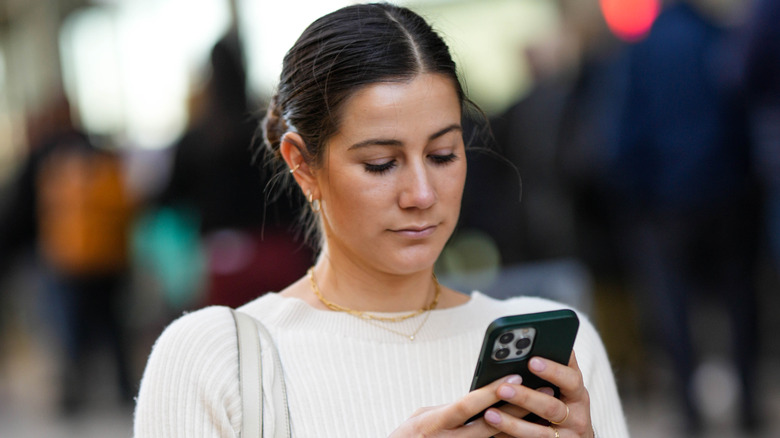A Full 180: All About 'Deinfluencing' And Why It's Going Viral On TikTok
Influencer. Influencing. Influenced. These words have become so pervasive in our cultural vernacular that they have begun to lose meaning. What does it mean to influence, now, when it seems that every other person you know has a brand deal to create an ad for a product on TikTok? A new item appears to go viral each hour. When we log into our social media platforms, we expect to be advertised to — relentlessly. And now, it seems, even TikTokers themselves are getting sick of the constant trend manufacturing.
In a strangely meta turn of events, TikTokers are now using the platform to start a new trend called "deinfluencing," where they share the pitfalls of products they bought or see advertised as the new best thing, and why you should not purchase them. While it seems rather antithetical, the hashtag #deinfluencing has more than 116 million views at the time of this writing. But the sudden, 180 degree turn from sell to quell has us skeptical. What is this trend actually about?
TikTok has been a hotbed for not just commercial trends, but also social movements, including a viral celibacy trend that exploded on TikTok, and a "financial cleanse" for managing your money. But "deinfluencing" might be less honest than it seems.
Not an awakening, but a strategy
The standard "deinfluencing" video goes like this. A TikToker with excellent lighting sits down in front of the camera with a stash of products offscreen they were influenced to buy and ended up disliking. One by one, they go through each, sharing where the product went wrong for them. TikTokers will sit close to the camera, speaking to the lens as though spilling a secret, as though having a divergent opinion on a viral product is a particularly juicy internet sin — and perhaps it is.
But it is possible that the trend "deinfluencing" is just that — a trend, disguised as an anti-trend. Lia Haberman writes in her Substack "ICYMI" that de-influencing is not an awakening of a sudden anti-capitalist sentiment, but a content strategy. In the end, it will still spur viewers to buy products, just maybe not the one being dissed. "De-influencing is not about authenticity or rejecting consumerism. It's a content strategy. This isn't about consuming less, it's finding a new way to curate and recommend products," Haberman writes.
In one TikTok video, @stazzylicious goes through an array of products that she felt weren't worth the excitement, and offers alternatives. One commenter wrote, "influencers will hype up a product, people will buy it, they will then say it sucks and move on to the next product in a loop." The video creator responded, "Im just doing a trend its not that serious girl."
Some sincerity to the trend
Some TikTokers do seem to genuinely appreciate the sentiment behind the "deinfluencing" trend, acknowledging that the pace of new, viral products is ultimately unsustainable. TikToker @impactforgood_ was one such content creator with high hopes for the trend who felt quickly let down by how it transformed. She said in a video, "I am already disappointed with the deinfluencing trend. When this trend first started, I was so excited to see people becoming aware of their spending habits," she said. She remarked "the trend was absolutely beautiful" when it focused on "realizing how we spend our money because overconsumption is ruining our mental health, it's horrible for our wallets, and it is horrible for the environment." Now, she says, it's become about finding dupes of disliked products, products that are actually worth the spend, and plugging Amazon storefronts.
"More stuff does not equal more happiness," she reminds her viewers.
Another TikToker, @simplyaubrie, affirms in her #deinfluencing video that you do not need purchase dupes of a "deinfluenced" product. "If I see the word DUPE one more time on my FYP I'm going to scream. I don't want this to come across as tone deaf, it's more about overconsumption, not about buying THE product because it's trending," she writes in her caption.
Another TikToker, @madisonrougerie, speaks directly to brands themselves in her video. "Influencer marketing is no longer working," she says. Consumers are "desperate right now to find brands that offer authenticity, find creators that offer authenticity."
